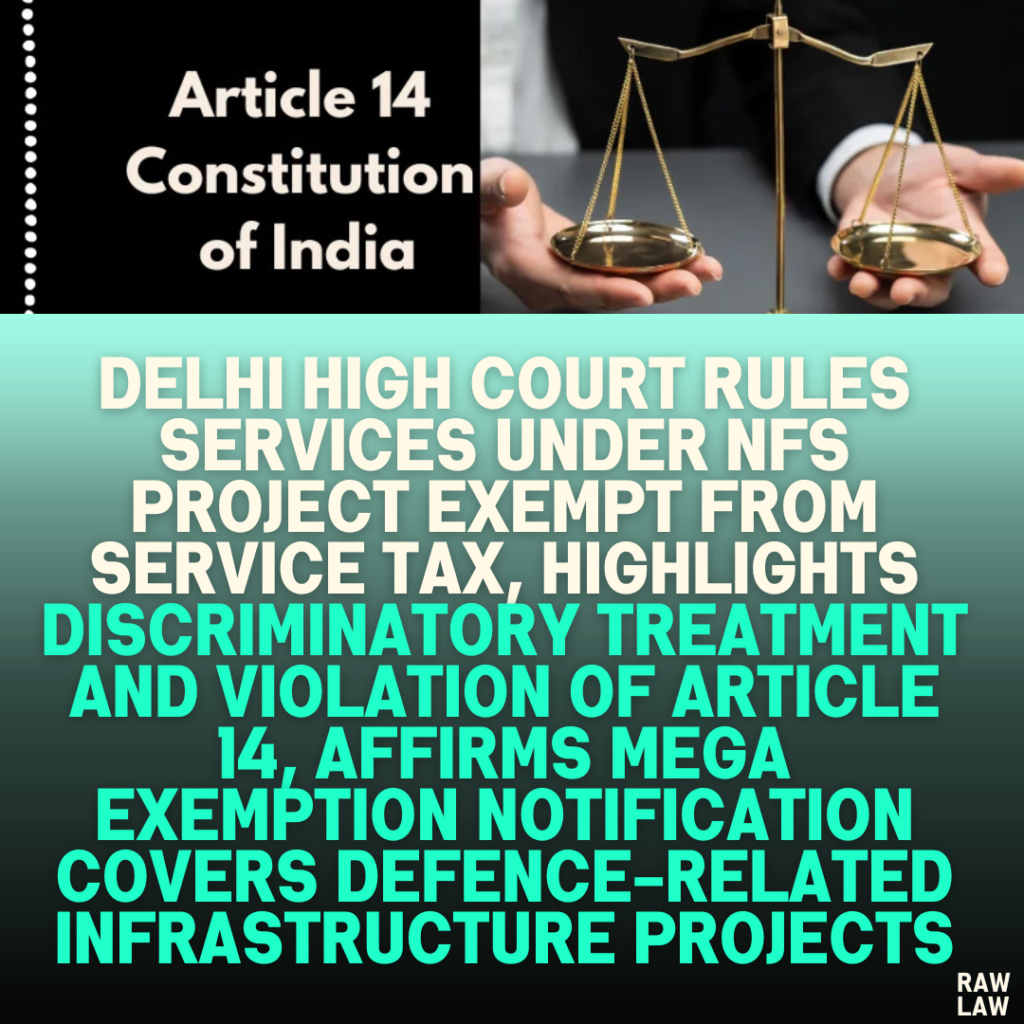1. Court’s Decision:
The Delhi High Court ruled in favor of the petitioner, setting aside the advance ruling that imposed service tax on services provided under the NFS Project. The court held that:
- The services were exempt from service tax under the Mega Exemption Notification.
- The differential treatment of the petitioner compared to other contractors violated the right to equality under Article 14 of the Constitution.
- The petitioner is entitled to relief based on the court’s observations.
2. Facts of the Case:
- Tender for NFS Project:
- Bharat Sanchar Nigam Limited (BSNL) floated tenders to create an Optical Fiber Cable Network for the Defence Services under the NFS Project.
- This network aimed to provide a dedicated and secure communication channel for the Defence Forces.
- Award of Work:
- The petitioner, a government enterprise, secured a tender for work in Rajasthan, Uttar Pradesh, and Uttarakhand under a Purchase Order (PO) dated September 9, 2014, worth ₹14,486.07 crores.
- The PO explicitly stated that service tax was not applicable.
- Dispute on Tax Treatment:
- Initially, the petitioner charged service tax on its invoices per the approved Bill of Quantities (BoQ). BSNL, however, refused to pay the service tax, claiming that the services were exempt under Entry 12A of the Mega Exemption Notification.
- In response to the confusion, the petitioner sought an advance ruling from the Customs Authority for Advance Rulings, which held that service tax was applicable. The petitioner challenged this ruling before the High Court.
3. Issues:
- Whether the services provided by the petitioner under the NFS Project are exempt from service tax under the Mega Exemption Notification.
- Whether the denial of exemption to the petitioner amounted to discriminatory treatment, violating Article 14 of the Constitution.
4. Petitioner’s Arguments:
- Exemption Criteria:
- The petitioner argued that BSNL was only an implementing agency, and the ultimate beneficiary of the services was the Ministry of Defence. As the services were provided to the Government of India, they qualified for exemption under Entry 12A of the Mega Exemption Notification.
- Discriminatory Treatment:
- It was pointed out that other contractors under identical POs issued by BSNL were granted service tax exemptions. For instance, Vindhya Telelinks Limited (VTL), another contractor for a similar region, was granted a refund of service tax under the same project.
- Nature of the Services:
- The petitioner emphasized that laying the Optical Fiber Cable Network was civil infrastructure work intended exclusively for the Defence Forces, qualifying it for exemption.
5. Respondent’s Arguments:
- Nature of Recipient:
- The respondents argued that BSNL, not the Ministry of Defence, was the recipient of services. Since BSNL did not qualify as “government” under the notification, the exemption could not apply.
- Scope of the Work:
- The respondents contended that the services were commercial in nature and did not fall under the exempt categories in the Mega Exemption Notification.
- Justification of Advance Ruling:
- The advance ruling was defended as consistent with the law, and the petitioner’s claim of discriminatory treatment was denied.
6. Analysis of the Law:
- Mega Exemption Notification:
- Entry 12A of the notification exempts services provided to the government or government authorities for infrastructure projects intended for non-commercial use.
- Entry 29(h) extends this exemption to subcontractors providing services under exempt works contracts.
- Precedent Analysis:
- The court relied on the Supreme Court judgment in State of Andhra Pradesh v. Larsen & Toubro Limited, which held that works executed by subcontractors for exempt projects should also be treated as exempt.
- Applying this principle, the court held that the petitioner’s services qualified for exemption as they were for a non-commercial infrastructure project benefiting the Ministry of Defence.
- Equality under Article 14:
- The court noted that other contractors, such as VTL, were granted exemptions for similar POs. Denying the same benefit to the petitioner created arbitrary and discriminatory treatment, violating Article 14 of the Constitution.
7. Court’s Reasoning:
- Recipient of Services:
- The court observed that the ultimate recipient of the services was the Defence Forces, not BSNL. BSNL was merely an implementing agency for the Ministry of Defence, making the services eligible for exemption.
- Discriminatory Treatment:
- The court highlighted the inconsistent application of tax exemptions. Similar POs issued under the same project were treated differently without any rational basis, creating an unjust and unequal tax regime.
- Clarity on Exemption:
- The court emphasized that the Mega Exemption Notification explicitly exempted such services, and the advance ruling ignored the legislative intent.
8. Conclusion:
The court quashed the advance ruling and held that the services provided under the NFS Project were exempt from service tax. The petitioner was entitled to relief, including the refund of service tax paid and other consequential benefits.
9. Implications of the Judgment:
- Clarity on Tax Exemptions:
- The judgment reinforces the scope of the Mega Exemption Notification, clarifying that government projects aimed at public welfare or defence are eligible for tax exemptions.
- Consistency in Tax Treatment:
- The judgment underscores the need for uniformity in applying tax laws, ensuring that similar projects and contractors are treated equally.
- Strengthening Constitutional Protections:
- By invoking Article 14, the court highlighted the importance of equality and non-discrimination in administrative decisions, setting a precedent for future cases involving arbitrary tax treatment.
- Impact on Infrastructure Projects:
- The ruling will likely influence the tax treatment of contractors and subcontractors involved in government infrastructure projects, encouraging greater participation in such initiatives
